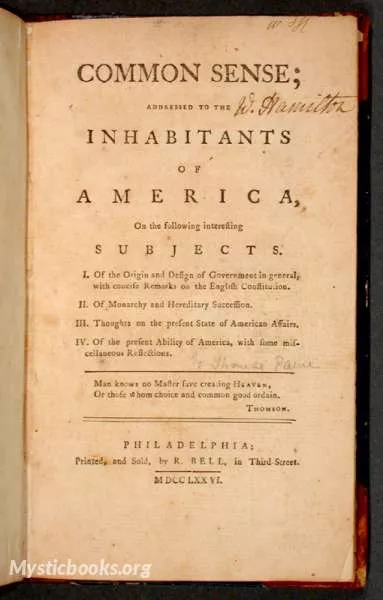
Common Sense
by Thomas Paine
'Common Sense' Summary
Common Sense is a pamphlet written by Thomas Paine in 1775–76 that inspired people in the Thirteen Colonies to declare and fight for independence from Great Britain in the summer of 1776. In clear, simple language it explained the advantages of and the need for immediate independence. It was published anonymously on January 10, 1776, at the beginning of the American Revolution and became an immediate sensation. It was sold and distributed widely and read aloud at taverns and meeting places. Washington had it read to all his troops, which at the time had surrounded the British army in Boston. In proportion to the population of the colonies at that time (2.5 million), it had the largest sale and circulation of any book published in American history.Common Sense presented the American colonists with an argument for freedom from British rule at a time when the question of whether or not to seek independence was the central issue of the day. Paine wrote and reasoned in a style that common people understood. Forgoing the philosophical and Latin references used by Enlightenment era writers, he structured Common Sense as if it were a sermon, and relied on Biblical references to make his case to the people. He connected independence with common dissenting Protestant beliefs as a means to present a distinctly American political identity. Historian Gordon S. Wood described Common Sense as “the most incendiary and popular pamphlet of the entire revolutionary era”.
Book Details
Language
EnglishOriginal Language
EnglishPublished In
1776Authors

Thomas Paine
English, American
Thomas Paine (born Thomas Pain; February 9, 1737– June 8, 1809) was an English-born American political activist, philosopher, political theorist, and revolutionary. He authored Common Sense (177...
Books by Thomas PaineDownload eBooks
Listen/Download Audiobook
Related books

Great Events in the History of North and South America by Charles Goodrich
This comprehensive reference book provides a detailed account of significant events in the history of North and South America, from the arrival of the...

A New England Girlhood: Outlined From Memory by Lucy Larcom
"Larcom served as a model for the change in women's roles in society." This is her colorful autobiography. Here, she tells about her happy childhood,...

Life of Washington, Volume 4 by John James Marshall
This volume of John James Marshall's comprehensive biography of George Washington focuses on the final stages of the American Revolutionary War and th...

Memoirs of a Revolutionist, Vol. 2 by Peter Kropotkin
Peter Kropotkin, a Russian scientist and revolutionary, recounts his experiences in the second volume of his memoirs. He details his life in St. Peter...

History of the Rise, Progress and Termination of the American Revolution Vol. 1 by Mercy Otis Warren
Mercy Otis Warren's 'History of the Rise, Progress and Termination of the American Revolution' is a comprehensive account of the American Revolution,...

My Lady of the Chinese Courtyard by Elizabeth Cooper
An insightful glimpse into the life of a Chinese lady of high society, told through two series of letters written over a span of 25 years. The first s...

Reflections on Violence by Georges Sorel
Georges Sorel's *Reflections on Violence* is a seminal work of political philosophy that explores the role of violence in social and political change....

Eleven Theses on Feuerbach by Karl Marx
The “Theses on Feuerbach” are eleven short philosophical notes written by Karl Marx in 1845. They outline a critique of the ideas of Marx’s fellow You...

The American Crisis by Thomas Paine
A 13 pamphlet series by 18th century Enlightenment philosopher/author Thomas Paine, published between 1776 to 1783 during and immediately following th...

Amurath to Amurath by Gertrude Bell
Gertrude Bell's 'Amurath to Amurath' offers a firsthand account of her five-month journey through the Middle East during a period of significant polit...
Reviews for Common Sense
No reviews posted or approved, yet...